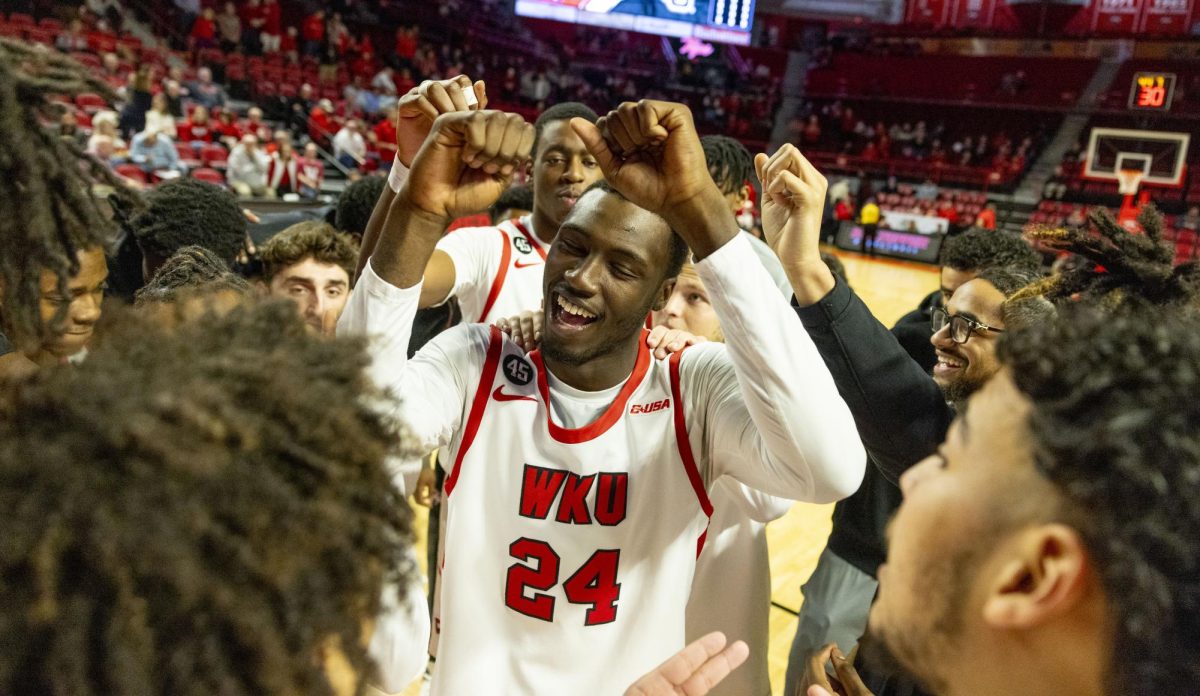Cops and Robbers
February 20, 2003
When Jason Harville approached the white Sedan, he didn’t know quite what to expect. The driver rolled his window down and waited. Harville walked up to the window with a flashlight in hand.
“Bang, bang,” Officer Joe Harbaugh said, pointing a plastic gun at Harville and his partner. “You’re both dead.”
Lawrenceburgh junior Harville and his mock backing officer, Bardstown sophomore Brandon Bryan, were two of about 20 participants in the second day of the University Police Academy.
The duo was “shot” as part of the mock traffic stops that included hidden weapons, fleeing passengers and unruly drivers.
The academy participants, made up of Western students and staff, traded roles with campus police officers.
Harbaugh said the purpose of the training activity was to show the participants all the possible things that could happen during what may seem like a routine traffic stop.
“There are a lot of different things that you have to do and keep in mind when making stops,” he said. “After this, hopefully there is a little more understanding of what we do.”
Tuesday night’s exercise was only the second meeting of the academy. Future academy sessions include fire arm training and awareness, crime prevention, crime scene investigation and the bike patrol obstacle course.
Harbaugh, Officer Lisa Brown and student patroller Brandon Sims were in the vehicles that were stopped by academy students.
Bowling Green sophomore Samantha Jones had to deal with an intoxicated driver, Harbaugh, during her mock traffic stop. Harbaugh repeatedly tested Jones and her partner Emily Butler, a graduate student from Portland, Tenn., by not following their directions, falling to the ground and sucking instead of blowing into the preliminary breath test machine.
“I can’t even do this sober,” Harbaugh said, stumbling his way through one of the sobriety tests.
A few moments later, after Jones asked him to spit out his gum, he spit his gum right at her feet.
“I didn’t think we would get to do stuff like this so soon,” Jones said, smiling through the wind.
When Jones and Butler attempted to hand cuff Harbaugh, he got a little frisky, and Butler had to push him onto the hood of the car. His head hit the metal with a thud.
“Sorry,” she said to Harbaugh, forgetting she was playing the role of a police officer.
The primary officers strapped on body armor and a utility belt — the equipment each campus police officer is required to wear. For the evening’s training, many of the items were missing from the belt. Normally officers carry an extra 24 to 27 pounds of weight during their 10-hour shifts.
The participants portraying the back up officers were in charge of operating the radio, lights and sirens on the police cars.
“I really, really wanted to drive the police car,” joked Gilbert Hall Director Kat Stewart. “You see, I’m a big fan of ‘Law and Order,’ so this kind of thing is very exciting for me.”
Stewart and her partner, ROTC instructor Keyonda Harper, had to deal with a passenger who drew a weapon, Sims, and an uncooperative driver, Brown, during their traffic stop.
“My heart was racing, and the adrenaline was pumping,” Harper said. “I never knew what was going to happen. My mind was going a hundred different ways.”
Harper knew the academy was going to be fun, but he said he never imagined it would be like what he experienced last night.
“They definitely went a step beyond what I could have imagined,” he said. “I hope other students can have the opportunity to get the insight that I did.”
Sgt. Kerry Hatchett and Harbaugh repeatedly stressed one idea police officers need to keep in the back of their minds — going home that night. They said safety is the number one thing.
“You just have to be prepared,” Hatchett said. “On every stop you have to think either there is drugs, they are drunk or they have a weapon. You need to remember that no traffic stop is routine; it might end routinely, meaning ‘uneventful,’ but you can’t go into it thinking it is just going to be a routine stop.”
He said he hopes the academy will change people’s views of Western’s police department.
“A lot of people look at WKU police as not being police but as security,” Hatchett said. “Hopefully, after activities like this, they will realize we deal with the same things (the Bowling Green Police Department) and other police departments go through everyday — fights, drugs and weapons.”
Reach Abbey Brown at [email protected].













